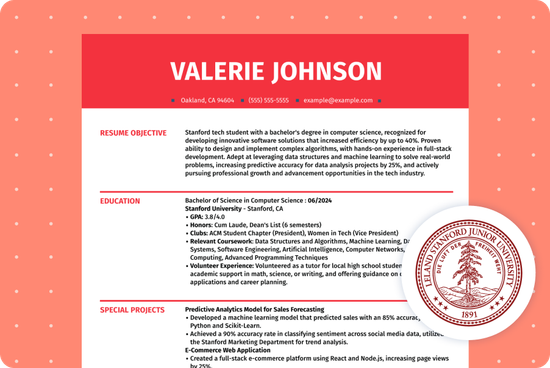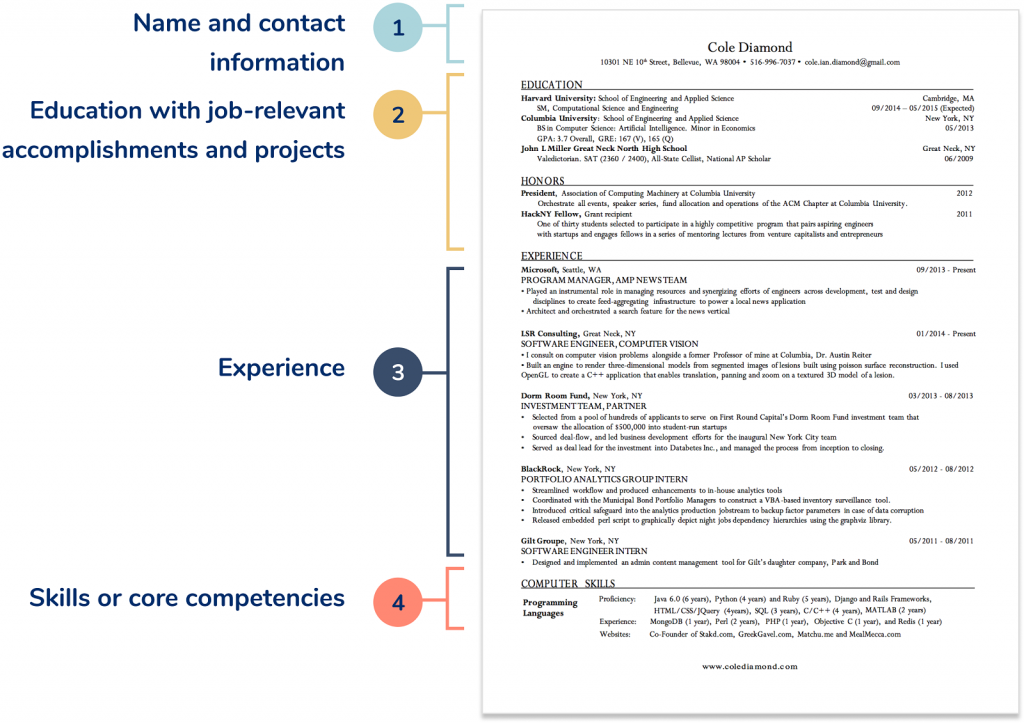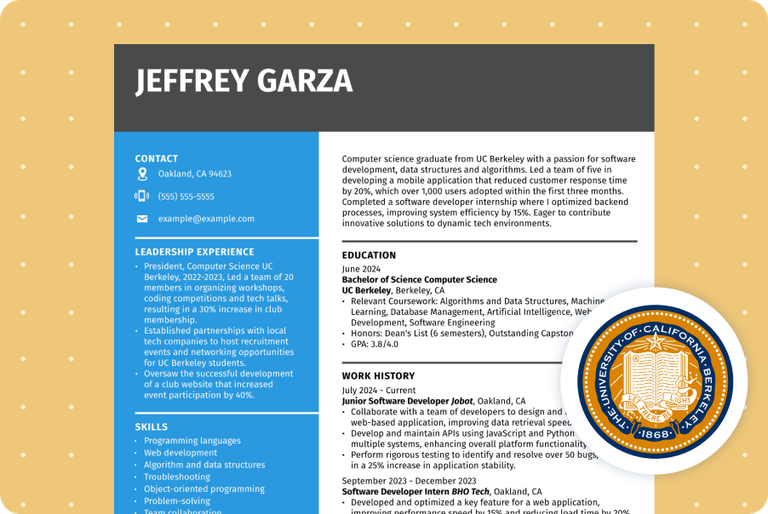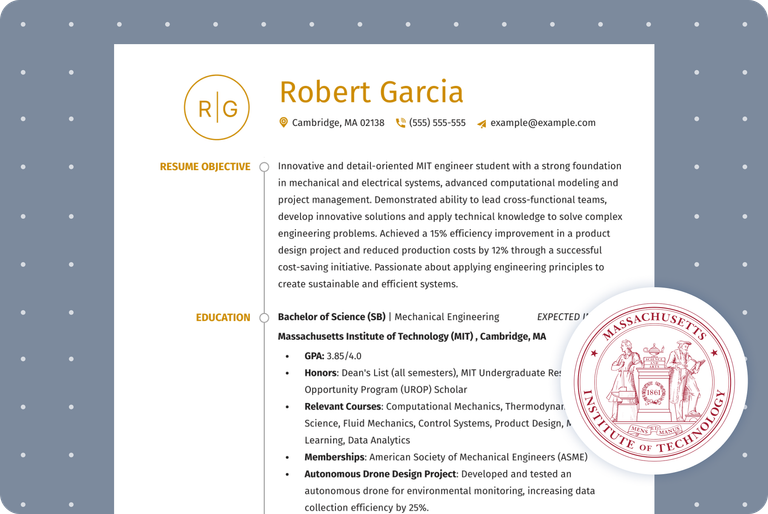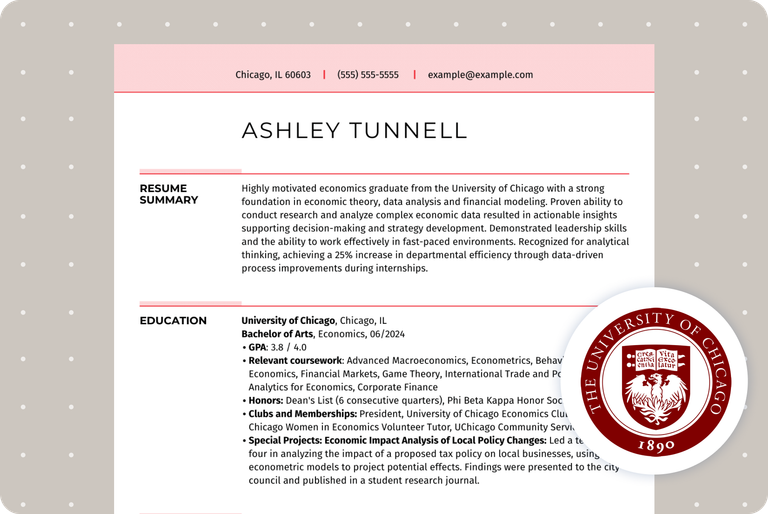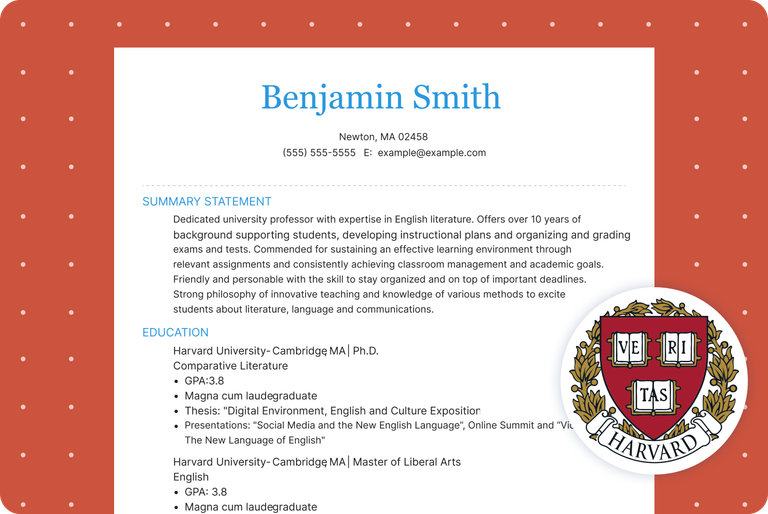Stanford Resume Template (Guide & Examples)

Our customers have been hired at: *Foot Note
Table of Contents
Get started with MyPerfectResume today!
- Build a resume on any device
- Pick an ATS-friendly template
- Tailor with AI copy suggestions
Stanford University is among the top five universities in the United States. With world-renowned engineering, business, and computer science academic programs, it stands out for its culture of innovation and close association with the tech industry.
Entering the job market with a resume detailing your time at Stanford can significantly improve your chances of landing an interview, especially in the STEM and business industries.
Below, we'll discuss how to optimize your Stanford resume to maximize your chances of success, and you'll find resume examples to gather inspiration.
What Is the Stanford Resume Format?
The Stanford resume format emphasizes your educational experience and provides flexibility to organize your information according to its relevance to the role.
Unlike traditional resume formats, this layout focuses on playing to your strengths and can often divide the work history section into specific experiences such as leadership, research, teaching, professional, etc.
However, it maintains standard formatting rules, such as 10-12 point font size and .5—one-inch margins, and uses bullet points, bold, and italics to maximize readability.
How to Structure Your Stanford Resume
Each resume section is an opportunity to communicate the kind of professional you are and how your academic and career experiences helped you prepare for this position.
Let's review how to create each section of your Stanford resume.
Write an Attention-Grabbing Resume Summary
Approach your resume summary as if it were an elevator pitch. Use no more than three sentences to highlight your top skills and accomplishments and demonstrate your fit for the role. Here's an example:
Highlight Your Education
The Stanford University resume template features the education section prominently at the top. Start with your highest degree, including the university name, degree and concentration.
Under each academic entry, you can also include:
- Honors
- Research
- Relevant coursework
- Thesis
- Memberships to relevant teams or clubs
- Conferences
Here's an example:
Masters in Computer Science
Code Nexus Society
Dean's List
Showcase Your Experience at Stanford
While your work history section can be divided into types of experiences, it must always follow a reverse chronological order. Whether it's research, leadership or professional experience, begin with your most recent position and include the company or organization's name, location and dates.Be sure to include only experiences that convey your suitability for the role. When applicable, add quantifiable accomplishments using strong action verbs to show the employer you're an innovator in your field. For example:
San Francisco, CA | June 2023 – August 2023
- Developed and deployed a full-stack web application using React, Node.js, and MongoDB, resulting in a 25% increase in user engagement for the company's main product.
- Collaborated with a team of engineers to implement an API that reduced data processing time by 30%, improving overall application performance.
- Conducted code reviews and contributed to refining best practices, enhancing the codebase's maintainability and scalability.
Incorporate keywords from the job description to tailor your resume to the role and pass ATS scans.
Feature Relevant Skills
Create a balanced list of six to eight hard skills and soft skills to further advocate for yourself and showcase your expertise.Include Optional Sections
Stanford resume templates typically include optional sections such as research experience, volunteer work, leadership, honors and awards, etc. It's an excellent opportunity to display a well-rounded skill set and convince employers you're the right fit for the role.
Format this section the way you would your work history section. See how it might look:Leadership Experience
President | Code Nexus SocietyStanford University | September 2022 – June 2023
- Led a team of 15 students to organize workshops, hackathons, and speaker events, increasing membership by 40% and fostering a collaborative environment for aspiring tech professionals.
- Secured partnerships with tech companies, including Google and Microsoft, for mentorship programs and sponsorships, enhancing opportunities for members to network and gain industry insights.
- Spearheaded the creation of a peer-to-peer coding support system, resulting in a 20% improvement in members' coding skills and project completion rates.
Stanford Resume Examples
See over 800+ resume examples for different jobs, industries, and career levels.
Create a Cover Letter to Match Your Stanford Resume
A cover letter is a one-page document that expands on your resume and allows you to explain how your skills and expertise align with the employer's needs. Our Cover Letter Generator can help you craft a compelling letter with job-specific suggestions and professionally designed cover letter templates.
When writing your cover letter, follow the tips below:
- Use a traditional cover letter format.
- Keep it to one page.
- Establish a personal connection by addressing it directly to the hiring manager.
- Outline how your past professional experiences prepared you for this opportunity.
- End with a call to action.
Stanford Resume Tips
Follow these tips to impress recruiters with a standout resume:
- Read the job description carefully and customize your resume to fit the position.
- Use a professional and readable resume font.
- Choose a resume template with stacked sections to maximize readability.
- Keep margins between .5 and one inch for a balanced white space in your resume.
- Use our AI Resume Builder to create a resume with our expert content suggestions.
- Remember to spell-check multiple times and ask a friend to proofread your resume.
FAQ
How Do I Choose Between a CV or a Resume?
Knowing when to use a CV vs a resume relies on the employer’s requirements. Usually, scientific, academic and medical jobs will ask applicants to submit a CV. Any other industry will typically require a resume.
Before sending your application, read the fine print to ensure you’re submitting the correct document.
How Do I Write a Stanford Resume for Fine Arts?
When writing a Stanford fine arts resume, highlight artistic skills related to your specialization, whether theater, music, photography, etc. Include any fine art experience demonstrating your career interests in your work history.
The goal is to create a resume that offers a brief but unique look into the artist you are. Employers in fine arts typically expect work examples, so consider including an online portfolio or video resume in your job application.
What Skills Should I Include in My Stanford Resume?
The skills you include in your resume will depend on your expertise and qualifications, and the position’s requirements. For example, if you’re applying for a job in tech, you should consider adding some of these skills to your resume:
- Agile methodologies
- Cloud computing
- Data analysis
- Database management
- DevOps
- Machine learning
- Programming languages
- Version control
If you have little experience in your desired field, transferable skills are a great alternative to show the employer you have knowledge that can be applied to the job.
Explore our Yale resume templates for additional examples of key skills to feature on your resume.
How we reviewed this article
Since 2012, we have helped more than 11 million job seekers. We want to make your career journey accessible and manageable through our services and Career Center’s how-to guides and tips. In our commitment to bring you a transparent process, we present our Editorial Process.
Our customers have been hired at:*Foot Note
